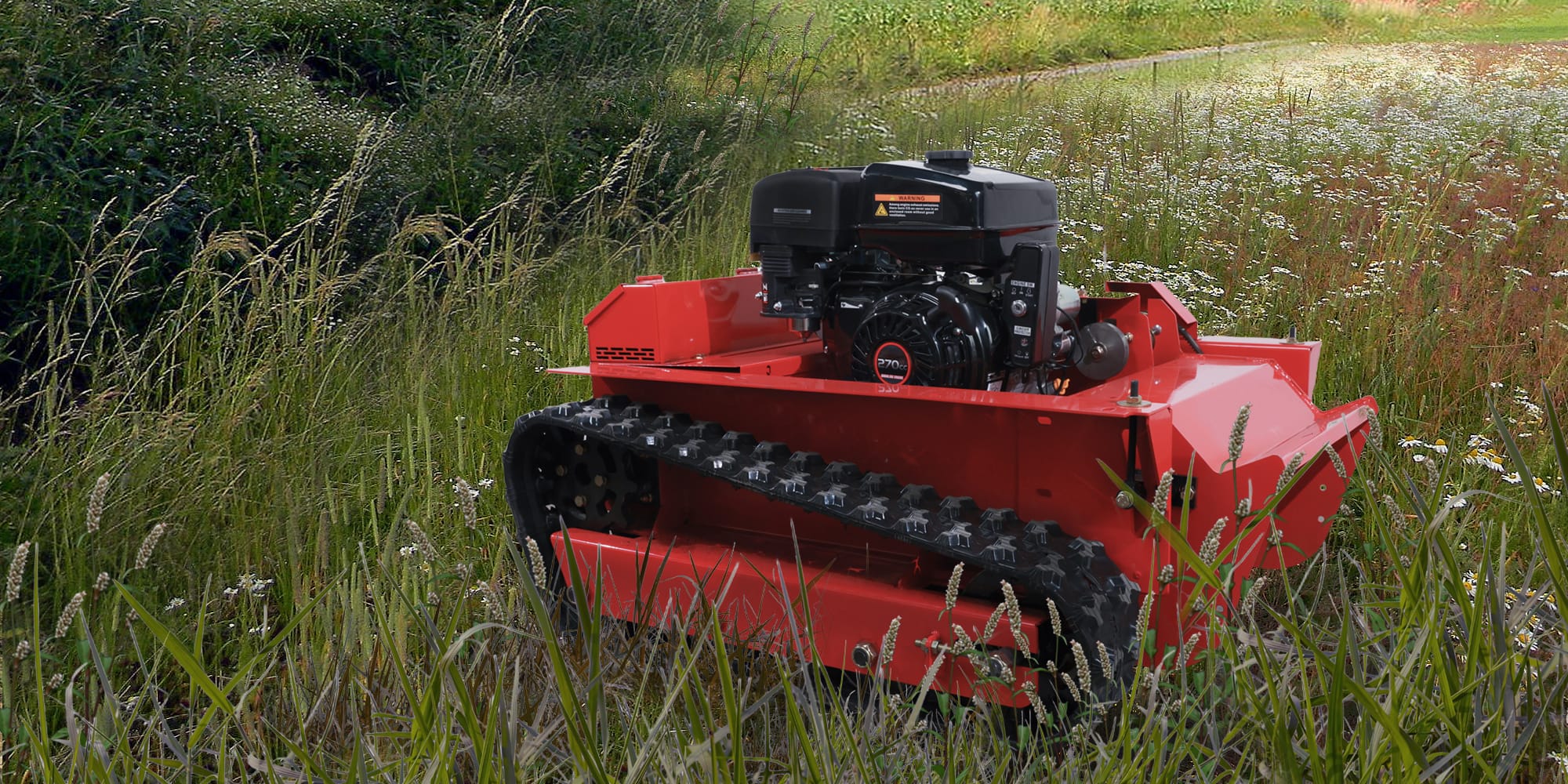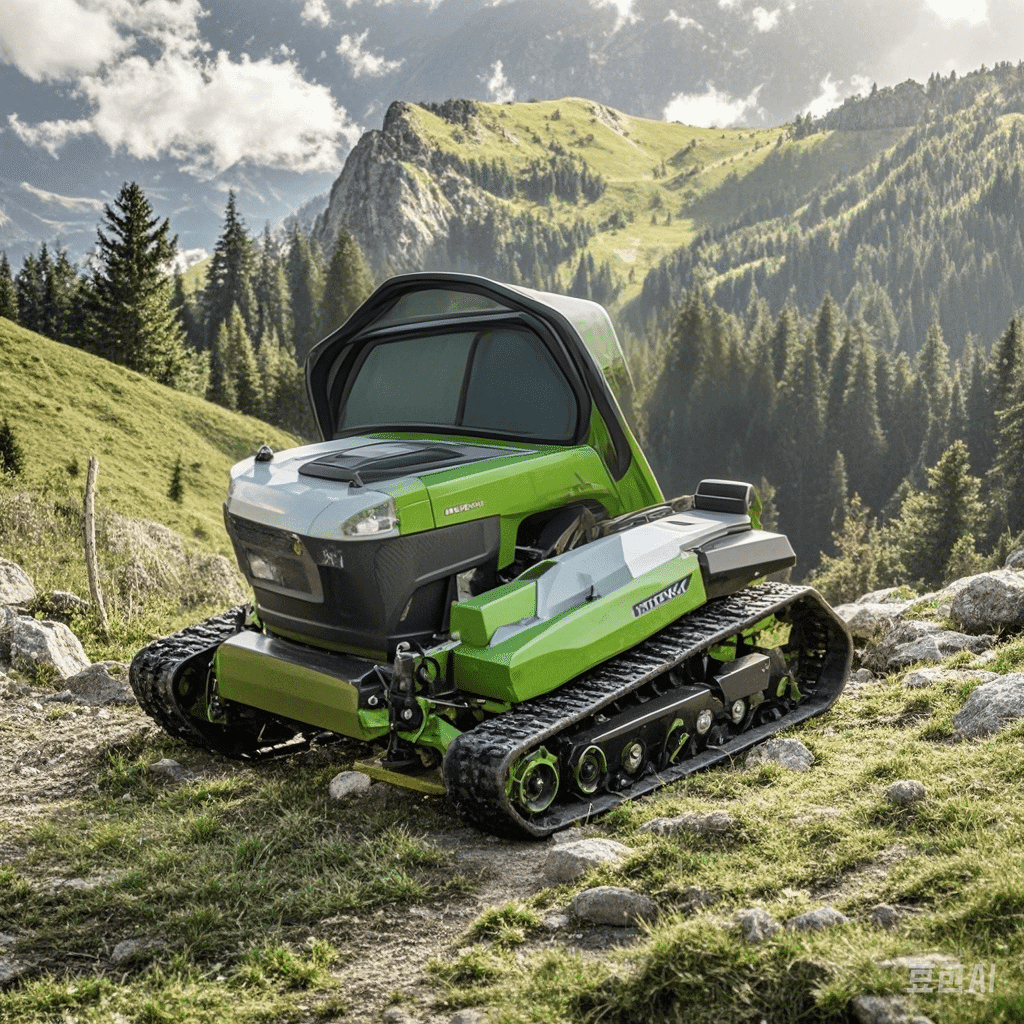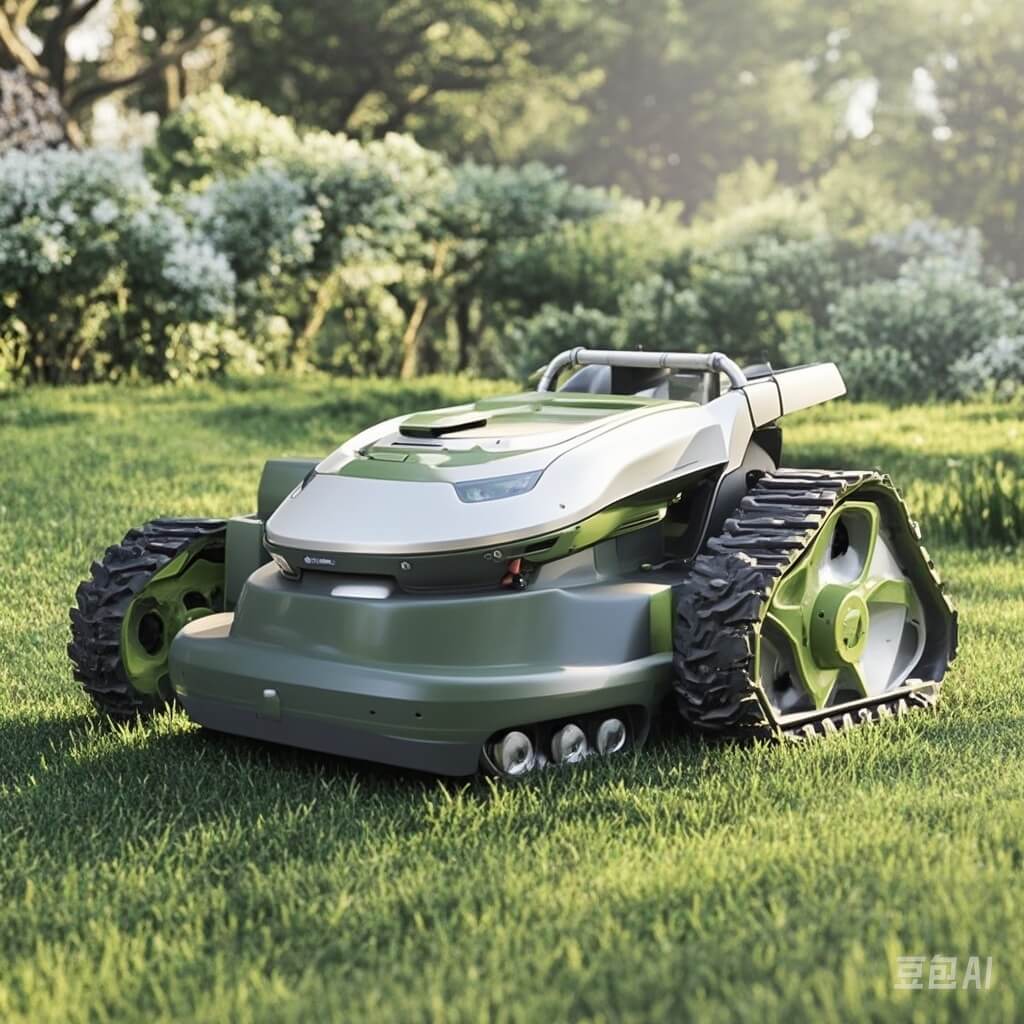No products in the cart.


Remote control lawn mowers represent a significant innovation in the field of landscaping and gardening. Unlike traditional lawn mowing equipment, these advanced machines operate using a remote control, offering enhanced convenience and efficiency. Basic functionalities include the ability to maneuver the mower from a distance, adjust cutting heights, and navigate various terrains without direct human intervention. Technological advancements have further refined these machines to handle complex tasks, such as slope mowing and trimming edges with precision.
A crucial feature of modern remote control lawn mowers is their capability to tackle challenging landscapes. Equipped with robust crawler systems, these mowers navigate slopes and uneven surfaces effortlessly, ensuring a uniform cut across the terrain. This aspect is particularly beneficial for community botanical gardens, where maintaining large and diverse landscapes can be demanding.
In addition to their mechanical prowess, remote control lawn mowers incorporate sensors and programming capabilities. These technologies enable the mowers to map out mowing paths, avoid obstacles, and operate autonomously within defined areas, substantially reducing the physical effort required by gardeners. The integration of such advanced features distinguishes these machines from traditional mowers, which primarily rely on manual operation and are often limited in terms of versatility and efficiency.
Remote control lawn mowers embody the evolution of gardening tools in response to modern landscaping needs. By offering precision, efficiency, and the ability to manage various terrains, they provide an indispensable solution for maintaining extensive and intricately designed gardens. As botanical gardens continue to evolve, the adoption of such innovative equipment ensures that they remain well-maintained, allowing visitors to enjoy their beauty with minimal maintenance disruptions.
Community botanical gardens often encompass a diverse landscape, including steep slopes, rough terrain, and dense vegetation. Such environments pose significant safety challenges for garden staff tasked with regular upkeep and maintenance. The adoption of remote control lawn mowers represents a substantial advancement in mitigating these safety hazards.
One of the primary safety benefits of remote control lawn mowers is the minimization of physical exposure to potentially dangerous areas. When dealing with steep slopes, the likelihood of slips, trips, and falls increases dramatically. Traditional push or ride-on mowers require staff to navigate these perilous inclines manually, introducing a high risk of injury. In contrast, a crawler lawn mower, which is designed specifically for slope mowing, can be operated from a safe distance. Staff can maintain these challenging landscapes without having to risk their own safety, thus ensuring that steep slopes remain well-manicured while reducing the chances of accidents.
Moreover, botanical gardens often harbor wildlife, including insects and small animals that may pose hazards to personnel. Remote control lawn mowers allow staff to manage areas with dense shrubs or high grass without the need for close physical interaction, thus avoiding potential encounters with snakes, rodents, or other wildlife. This is especially beneficial in minimizing the risk of bites, stings, or other injuries.
Additionally, managing rough terrain with conventional mowers can be strenuous and perilous. Remote control mowers, equipped with advanced traction technology, can navigate rocks, roots, and uneven ground with ease. This minimizes the physical strain on garden staff and reduces the likelihood of mower overturns, which can be dangerous.
By incorporating remote control lawn mowers, botanical gardens can maintain their aesthetic appeal while safeguarding their workforce. This technology not only enhances operational efficiency but also ensures that garden staff can perform their duties with significantly reduced risk of physical harm.
In botanical gardens, the efficient management of expansive landscapes is crucial to maintaining their aesthetic and functional appeal. Remote control lawn mowers hold substantial promise in enhancing the efficiency of landscaping tasks within such environments. These sophisticated machines can operate autonomously or be controlled remotely, ensuring that large areas of grass are kept in optimal condition with minimal human intervention.
The beauty of remote control lawn mowers lies in their ability to function both autonomously and under human supervision. When set to autonomous mode, these mowers follow pre-programmed paths to ensure thorough coverage of the designated lawn area. This autonomous operation is particularly beneficial for botanical gardens, where various terrains and extensive lawns are involved. By assigning mowing tasks to these high-tech machines, the horticultural staff can redirect their attention towards other crucial responsibilities such as plant care and garden development.
Several botanical gardens have witnessed enhanced productivity and significant time savings through the adoption of remote control and crawler lawn mowers. For instance, a renowned botanical garden in Europe implemented a fleet of remote control mowers to handle slope mowing tasks. Traditionally, these areas would require significant man-hours and physical exertion from the gardening staff. However, with the introduction of crawler lawn mower technology, these challenging sections can now be efficiently managed without posing any danger to the staff, therefore improving overall productivity.
In another case, a community botanical garden in the United States replaced traditional lawn mowers with remote control models. This transition not only led to a 40% reduction in the time spent on mowing activities but also allowed the staff to focus on detailed horticultural tasks, such as pruning and planting, thereby enhancing the garden’s overall health and appearance.
By integrating remote control and crawler lawn mowers into their maintenance routines, botanical gardens can achieve unparalleled efficiency and significant time savings, making it possible for staff to engage in more specialized and impactful horticultural work.
Precision plays a vital role in maintaining the pristine beauty of community botanical gardens. Remote control lawn mowers excel in this regard, offering unmatched accuracy compared to manual mowing. These advanced devices are capable of navigating intricate landscapes, tight corners, and varied terrains with exceptional efficiency, ensuring that every section of the garden is trimmed to perfection. The remote operation of these mowers ensures consistent results, minimizing human error and promoting uniformity throughout the garden.
Another critical advantage of remote control lawn mowers is their environmental friendliness. Traditional gas-powered mowers are notorious for their emissions, contributing significantly to air pollution. In contrast, remote control mowers, especially electric and crawler variants, produce substantially fewer emissions. This leads to a cleaner garden environment that aligns with modern sustainability practices. Many remote control mowers can operate on renewable energy sources, further reducing their carbon footprint and helping botanical gardens achieve their eco-friendly goals.
Noise pollution is another environmental aspect where remote control lawn mowers outshine their conventional counterparts. Gas-powered mowers generate significant noise, which can disrupt the tranquility of botanical gardens and disturb visitors and wildlife. Remote control mowers, however, operate quietly, maintaining the serene atmosphere that visitors and staff alike cherish. This not only enhances the visitor experience but also creates a more peaceful habitat for the garden’s flora and fauna.
Incorporating remote control lawn mowers into the maintenance routine of community botanical gardens is a forward-thinking step towards a sustainable future. Their precision in mowing delicate landscapes ensures the garden’s aesthetic integrity, while their environmental benefits, such as reduced emissions and lower noise levels, contribute to the garden’s sustainable practices. These mowers represent a harmonious blend of technology and nature, supporting the ongoing efforts to preserve and enhance community botanical gardens for future generations.
When considering the adoption of a remote control lawn mower for community botanical gardens, it is essential to evaluate its cost-effectiveness over the long term. Although the initial investment in a remote control or crawler lawn mower can be higher compared to traditional mowers, the long-term savings often justify the expense.
One of the most significant benefits of using remote control lawn mowers is the reduction in labor costs. Operating a conventional mower on large, uneven, or steep terrains, such as those commonly found in botanical gardens, requires more manpower and involves higher labor expenses. A remote control mower, particularly designed for slope mowing, minimizes the need for multiple operators and decreases labor inputs, thereby generating considerable savings over time.
Remote control lawn mowers generally have a robust design tailored for demanding environments. They tend to require less frequent maintenance compared to traditional mowers. These machines are engineered to handle tough terrains efficiently without putting excessive strain on the mechanical components. This results in less wear and tear, thereby reducing the expenditure associated with regular maintenance, repairs, and part replacements.
The durability and high-quality construction of remote control mowers contribute to a longer lifespan. Traditional mowers might need more frequent replacements, especially when used in challenging botanical garden settings. In contrast, a crawler lawn mower designed for rugged terrains can last significantly longer, presenting an excellent return on investment. Extended operational life translates into financial savings, as community gardens do not need to reinvest in new mowing equipment as often.
By analyzing the long-term cost savings, it becomes evident that the investment in remote control lawn mowers is financially sound. Decreased labor costs, fewer maintenance requirements, and enhanced durability collectively lead to substantial cost-effectiveness. Depending on the specific conditions and usage frequency, community botanical gardens could see a full return on investment within a few years. The savings created from using such specialized mowers can then be reallocated to other critical garden development and maintenance activities.
Remote control lawn mowers, particularly crawler lawn mowers, have revolutionized how botanical gardens approach terrain management. These advanced machines are engineered to handle the diverse terrains commonly found in botanical settings, including slopes, uneven grounds, and fragile flower beds. The ability to control these mowers remotely allows for precision in navigating and maintaining various landscapes without causing disruption to the gardens’ intricate designs and delicate ecosystems.
One of the standout features of remote control lawn mowers is their capability to tackle slope mowing with ease. Traditional mowers often struggle on steep inclines, but the crawler design of modern remote mowers provides enhanced stability and traction, allowing them to efficiently mow even the steepest of slopes. This not only ensures uniform grass height but also reduces the risk of accidents and mechanical strain on the mower itself.
Moreover, uneven and rocky grounds are no longer a hindrance to maintaining a well-manicured garden. Remote control lawn mowers are designed with robust undercarriages and adaptive suspension systems that enable them to navigate rough terrains seamlessly. This adaptability ensures that the grass is cut evenly across all areas, enhancing the overall aesthetic of the garden.
In botanical gardens, the preservation of delicate flower beds is paramount. Manual mowing in these sensitive areas can be challenging and damaging. However, remote control lawn mowers can be adjusted for precise cutting heights and directed to avoid specific zones, preserving the integrity of intricate plant arrangements. Their fine-tuned control system minimizes the risk of accidental damage to young plants and flowers, maintaining the garden’s visual appeal and botanical diversity.
Overall, the integration of remote control and crawler lawn mowers in botanical gardens significantly enhances terrain management. Their ability to adapt to various conditions while preserving the landscape makes them invaluable tools for garden maintenance, ensuring that these verdant spaces remain pristine and inviting for all visitors.
Remote control lawn mowers represent a significant advancement in promoting accessibility and inclusivity in community botanical gardens. Traditional manual gardening tools often pose challenges for individuals with physical limitations or disabilities, restricting their ability to participate fully in garden maintenance activities. The introduction of remote control lawn mowers, especially models like crawler lawn mowers designed for slope mowing, provides an inclusive solution that empowers a diverse range of people to engage in garden upkeep.
These advanced mowers can be operated with minimal physical exertion, making it possible for individuals with mobility issues to effectively manage large garden areas. By accommodating various physical abilities, remote control lawn mowers ensure that staff and volunteers, regardless of their physical condition, can contribute meaningfully to the maintenance of botanical gardens. The technology opens up new opportunities for individuals who might have previously been unable to participate in such activities, thereby fostering a more inclusive working environment.
From a workforce perspective, the inclusivity offered by remote control lawn mowers can attract a more diverse range of employees and volunteers. Community botanical gardens can benefit from the skills, knowledge, and perspectives of a broader demographic, promoting varied contributions and innovations in garden maintenance. This inclusivity not only enhances the overall efficiency and aesthetics of the gardens but also enriches the community by promoting social integration and equity.
Moreover, remote control lawn mowers, with their enhanced accessibility features, can help botanical gardens adhere to principles of universal design. By reducing physical barriers and equipping all staff and volunteers with tools that cater to diverse needs, these gardens can set a precedent in the commitment to accessibility and inclusivity, thereby serving as a model for other public spaces.
The realm of remote control lawn mowing technology is poised for significant advancements, promising to revolutionize the maintenance of community botanical gardens. One of the most anticipated innovations is the integration of Artificial Intelligence (AI). By leveraging AI, remote control lawn mowers could navigate with greater precision, effectively mapping out the complex terrain of botanical gardens. This enhanced navigation capability is especially pertinent for crawler lawn mowers, which are adept at managing challenging landscapes, including slope mowing areas.
Improved battery life is another critical area of development. Current remote control mowers can already manage substantial workloads, but future iterations would aim to extend operational periods, reducing downtime and increasing efficiency. Extended battery life would allow these mowers to cover larger areas on a single charge, thus optimizing their performance for expansive botanical gardens.
Advanced remote control features are also on the horizon. Future remote control lawn mowers are likely to offer more intuitive and user-friendly interfaces, enabling gardeners to control mowers with greater ease and accuracy. Innovations such as real-time data analytics could empower users to monitor mower performance, schedule maintenance tasks, and predict potential issues before they arise, all from a centralized control system.
These technological advancements hold immense potential for community botanical gardens. Enhanced navigation, particularly in crawler lawn mowers, ensures meticulous care of intricate landscapes, contributing to the aesthetic and ecological health of the gardens. Improved battery efficiency supports more sustainable gardening practices by reducing energy consumption and emissions. Additionally, advanced remote control capabilities could free up valuable time for gardeners, allowing them to focus on more intricate horticultural tasks, thereby enhancing the overall beauty and biodiversity of the gardens.
Ultimately, the sustained evolution of remote control lawn mowing technology promises to elevate the standards of garden maintenance, ensuring that community botanical gardens remain vibrant, well-kept sanctuaries for years to come.
To learn about the machine demonstration video, please follow the Youtube account.www.youtube.com/@Yotatry-tech




Not only will we redefine our customers’ business models, but we will also redefine the OEM-dealer relationship, in other words, we will always have your back.